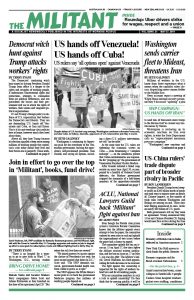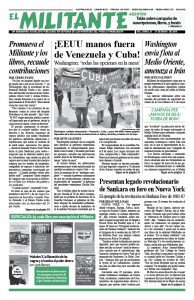Even though the Florida state prison system’s Literature Review Committee knows that the Militant appeals every attempt to ban the paper, the committee violated its own rules to rush and uphold the impoundment of two issues before the paper had a chance to appeal.
The committee upheld the ban on issue no. 15 on April 17, five days before the Militant received written notification, and the ban on issue no. 17 on May 1, just one day after. The Militant ’s lawyer, David Goldstein, has filed appeals, calling for both decisions to be reversed.
The fight against this censorship is important for the rights of workers behind bars and for all working people.
Why are committee members in such a rush to uphold censorship? Do they think that by moving quickly, it will be harder for the Militant to win support for the fight to overturn censorship? If so, they are mistaken.
“The National Lawyers Guild works closely with prison communities and our jailhouse lawyer members to ensure wide dissemination of engaging reading material, and calls for the full distribution of the Militant and the rescinding of its impoundment,” Guild President Elena Cohen said May 14.
“We urge the Committee to reverse the rejections at its next meeting and permit Florida prisoners to receive these issues of the Militant,” Benjamin Stevenson, staff attorney for the American Civil Liberties Union Foundation Florida, wrote May 6.
The Militant is asking workers to get their unions, church groups and others to get letters asking the Literature Review Committee to reverse the bans and send them to the Militant.
Florida officials never explain why a Militant issue has been banned. Instead, they fill out a generic form claiming that an article encourages activity that could lead to “physical violence,” is a “threat to security … of the correctional system,” or some other generality.
For issue no. 15, prison officials pointed to the article on the ongoing tour by Albert Woodfox promoting his book Solitary. He served over 40 years in solitary confinement, and is campaigning for its abolition.
Goldstein said in his appeal that the Department of Corrections cannot “ban the Militant because some officials disagree with the viewpoints expressed in these articles.” He noted that nothing in the article on Woodfox “so much as hints at any current prisoner taking any action whatsoever that could rationally be deemed as violent or presenting a threat to prison security.”
The ban on issue no. 17 is completely unclear. Prison officials’ notice only says: “Pages: 1,5,; Displicts [sic] protest continue in fight” and “Page: 9 Racism.”
But there are no articles in the paper headlined “protest continues in fight.” There was an article headlined “Protests Continue in Fight against Police Killing of Stephon Clark” in issue no. 12, which was banned by the same prison officials. But that ban was overturned.
Goldstein emailed the Literature Review Committee to find out which article in issue no. 17 is the reason for the ban. So far the committee hasn’t answered.
“We will fight against every impoundment. We defend the rights of our subscribers behind bars and their right to read the Militant,” said editor John Studer.

